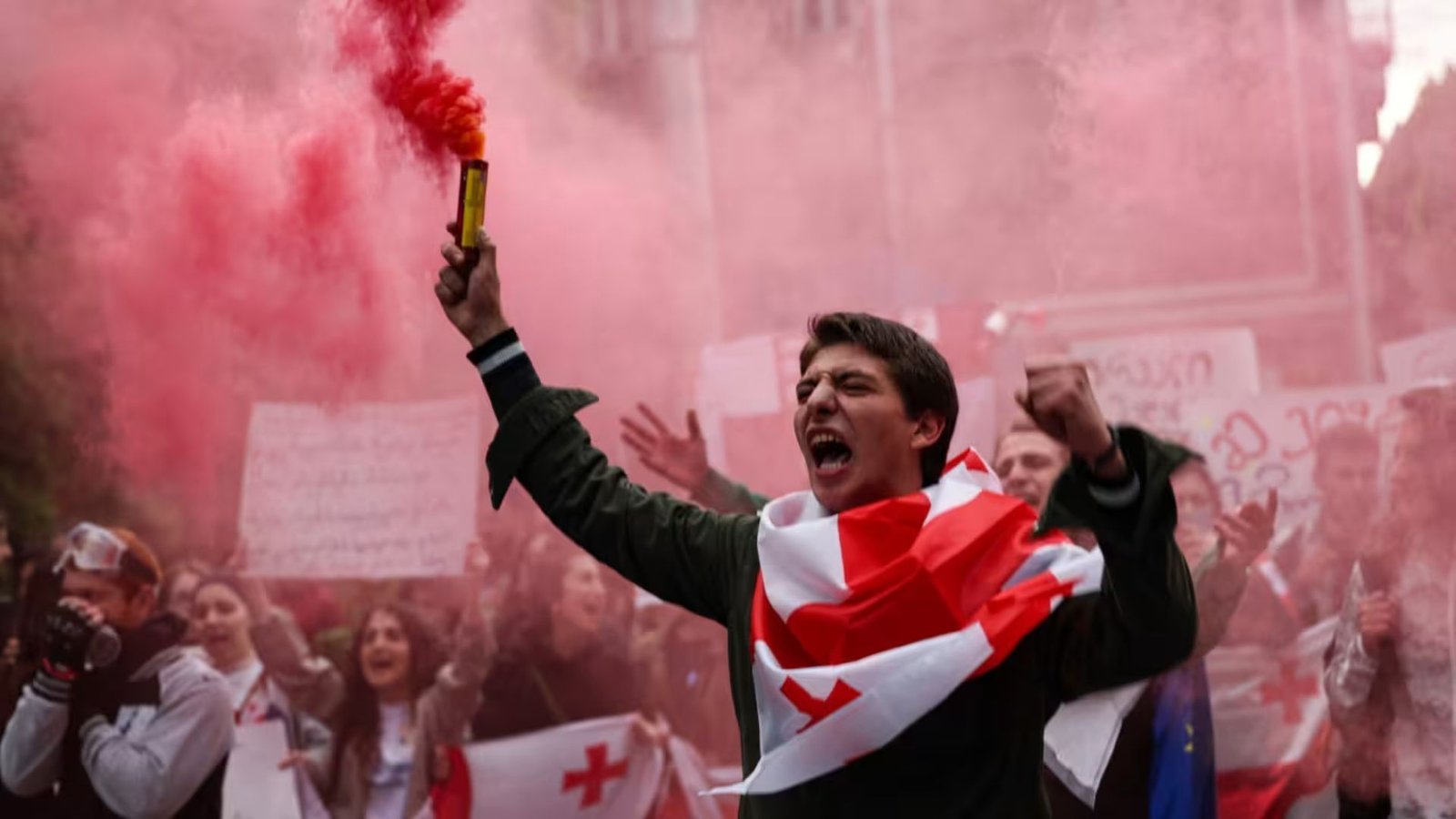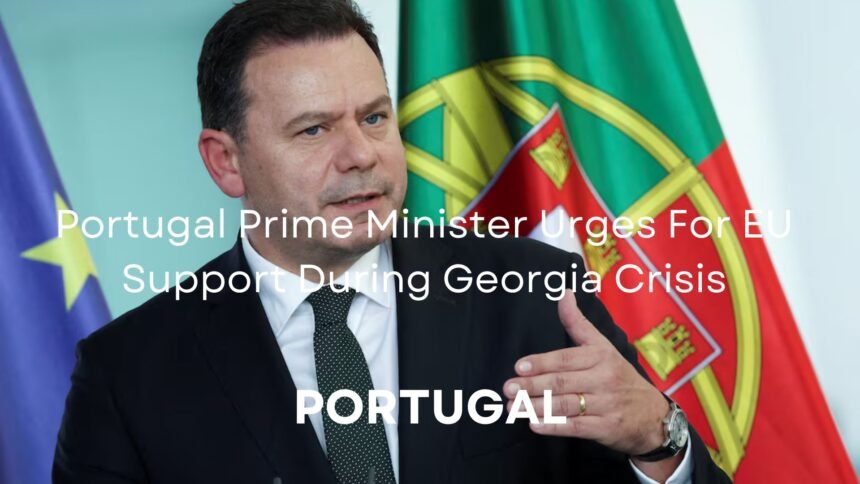Portugal Prime Minister Luís Montenegro has spoken in support of Georgia for the ongoing crisis. The country is facing protests after it stopped talks to join the European Union. The demonstrations have been met with violence which draws attention from many countries.
This crisis has raised questions about the future of democracy and European integration in Georgia. Portugal stance reflects growing international concern over the situation.
Read More About: Best Affordable Places For Living Near Lisbon City In Portugal
EU Support During Georgia Crisis

The Georgian government said that on November 28 it would stop negotiations with the EU until 2028. The government is led by the Georgian Dream party which is seen as pro-Russian. Many Georgians want to join the EU and were angered by this decision.
Protests began across the country and they are demanding the talks resume and holding the government accountable. The suspension has been described as a betrayal of the aspirations of the Georgian people. Many see EU membership as a path to economic growth and stronger democratic institutions. This decision has deepened the divide between the government and its citizens.
Prime Minister Montenegro Support Georgia
Prime Minister Montenegro talked about the situation during a debate in the Portuguese Parliament. He said Portugal and the EU must support democracy and human rights in Georgia.
He said:
We are following developments in the situation in Georgia with great concern. Portugal has reiterated and I believe this will be done at the European Council by our partners the importance of the European Union continuing the accession process and of reversing this trend of political power that is contrary to the people’s wishes
Montenegro emphasized the importance of staying committed to European values. He also added that the EU’s credibility depends on its ability to defend those principles. His comments suggest a wider EU agreement that democracy must be given top priority in its relations with partner countries.
Montenegro’s comments came before an EU Council meeting planned for December 19 and 20. This meeting is chaired by former Portuguese Prime Minister António Costa. He will discuss international issues including Georgia.
The meeting is expected to shape the EU’s next steps with potential measures aimed at supporting the Georgian people.
Protests And Violence In Georgia
The suspension of EU talks led to protests in Georgia. Thousands of people were on the streets. They accused the Georgian Dream Party of betraying their hopes for a European future. The protests were met with police violence.
Many demonstrators have shared stories of being beaten or detained during the protests. Human rights organizations have condemned these actions and called them violations of basic freedoms.
The protests have continued despite the heavy handed response which showcase the determination of the Georgian people to have their voices heard.
Reports say about 400 protesters were arrested. Many of them claim they were beaten by the police. International groups have condemned the use of excessive force. They have called on the government to respect people’s right to protest peacefully.
The scale of the violence has drawn criticism from countries worldwide which further isolates the Georgian government on the international stage. These events have highlighted the growing tension between the Georgian authorities and their citizens.
Journalists have also been targeted. Over 50 reporters were hurt while covering the protests. Press associations have criticized the attacks and asked for better protection for the media. Free press advocates say this is part of a broader trend of silencing dissent in Georgia.
Government said that 150 police officers were injured during the protests. These conflicting reports have added to the confusion and distrust surrounding the events.
EU Responds To The Situation
The European Union is keeping a close watch on Georgia. Montenegro said the EU does not want to interfere in Georgia’s affairs but will respond firmly.
He said:
Something is wrong when the government makes a U-turn and people don’t respect it, they demonstrate (…) in a very consolidated and relevant protest. EU must be very clear in telling the Georgian people and the authorities that the path of respect for human rights and the values of democracy must be ensured
Montenegro’s words underline the EU role in promoting stability and democratic values. The EU response is critical to ensuring that Georgia remains on the path to integration.
EU foreign ministers will meet on December 16 to discuss possible sanctions. These will include travel bans and freezing assets of those responsible for the violence. The EU has also called for an independent investigation into the clashes.
It has urged the Georgian government to talk with its people. Diplomats say that dialogue is essential to finding a peaceful resolution. The EU’s involvement will likely play a significant role in shaping Georgia future.
Portugal’s Role In Georgia Crisis
Georgia crisis is part of a bigger struggle between Western and Russian influences. The country’s location makes it important both strategically and politically. After it got its independence from Soviet Union in 1991, Georgia has tried to get closer to Europe.
Internal politics and Russian opposition have made this difficult. The country’s geopolitical position has often made it a battleground for competing interests which further complicate its path forward.
The Georgian Dream Party is in power from 2012. It has faced criticism for being too close to Russia. Critics say the party’s decision to pause EU talks shows it wants to keep control over Georgia’s future.
Many citizens want closer ties with Europe. This division reflects deeper political and social tensions within the country, with many citizens fearing that a pro-Russian stance will undermine their aspirations for a better future.
Portugal supports EU expansion and wants to help countries like Georgia. Montenegro’s comments show Portugal’s dedication to democratic values.
He said:
The EU must clearly tell the Georgian people and their leaders that democracy and human rights are essential.
Portugal’s leadership in this matter aligns with its broader commitment to foster peace and stability in Europe.
Many EU countries believe Georgia’s future depends on respecting its people’s wishes. Montenegro focus on human rights and democracy highlights Portugal’s role as a strong advocate for these values. Portugal voice may influence the EU’s overall approach to the crisis as discussions continue.
The EU’s actions will be important. Sanctions and diplomatic pressure may push the Georgian government to change its position. Observers say that sustained international attention will be crucial in ensuring a positive outcome.










